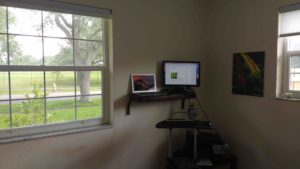
At my first home-office based sales job I spent the 1st Quarter hustling 10 hours a day prospecting for new customers, learning how to sell our solutions, and dealing with the challenges of working from home.
In the 2nd Quarter, having made little progress and having almost no contact with my manager & coworkers, my motivation dropped significantly. I still prospected most mornings and occasionally met with customers, but I spent most afternoons at the beach.
The 3rd quarter, I was laid off in a company wide Reduction in Force.
That was my introduction to the world of working as a remote (aka home office based) sales rep.
Since then, I’ve had the opportunity to work remotely for several different companies. At these companies I had remote Inside Sales reps, Field Sales reps and Sales Engineers working for me. My remote teams had some ups and downs but were mostly successful.
In this post I will share how I managed my remote Sales Teams, the mistakes I made, and the lessons I learned about working from home.
Before I build a remote Inside Sales team that works from home, I’ve learned it’s important to consider these questions:
Do I trust my reps and am I willing to measure them by their results? This is a must have requirement. Salespeople should always be measured by their results, but in many companies, time in the office, volume based activity, and face-time are used in lieu of good metrics. Getting buy in from executive management to measure results only is critical.
Can I accept not having immediate access to my reps during working hours? Think carefully before answering because this will happen. Remote reps will work flexible hours and will be walking the dog, picking up their kids, dealing with repairmen, and running errands during normal working hours. Am I really OK with this as long as they are hitting their primary objectives?
Will I help with home office & tech setup? If my rep has not worked from home before, he will need setup assistance with Internet, phone, wireless, web conferencing, Instant Messaging, CRM, backups, etc. I now anticipate this and include setup assistance in the onboarding process. In the past, when I hadn’t done this, I found that most of my reps struggled with getting their home office setup. I’m a techie who has worked remotely for more than a decade and it still takes me a few days to get my home office setup!
Are my reps experienced sales professionals? Working from home is easier for reps who have already learned the basics of “how to work” and “how to sell”. If I am hiring entry level reps for their first sales job, I’ve found that an office based team environment helps them learn the basics. Without this foundation, I’m setting them up for failure.
Have my reps ever worked remotely before? Reps who have worked from home offices before have an easier time transitioning to this setup. Even my beach bum experience enabled me to be much more productive the next time I worked remotely.
Will I over-communicate with my reps until we have established a solid cadence? Since my Standard Operating Procedure includes 1-on-1s, coaching, weekly sales team meeting and a weekly recap email, I’ve got this covered. I just add a few extra phone calls, texts, and Instant messages to build trust and foster communication with my team.
Do my reps have a compelling reason to work from home? My reps who thrived when working remotely cited these as reasons why they loved working from a home office:
“no long commute”, “live where I want”, “home to get kids to & from school”, “liked being independent”, “be my own boss”, “flexible hours”, “can’t stand office politics”, “more productive”
Would my reps rather work in an office? I’ve got to ask this. Some people thrive in an office environment with lots of face-to-face interaction and the energy they get from a team. Putting them in a remote office can be like sentencing them to solitary confinement.
TImes When Remote Sales Has Worked for Me
 When my Inside Sales team worked from our corporate HQ and we offered a work from home day as a privilege. As long as a rep was hitting quota, we’d let them work from home 1 day a week. Everyone loved this. It gave reps flexibility to schedule life events like doctor’s visits and repairmen appointments while still providing the camaraderie, face time, and culture of working with a team. We crushed our quotas month after month with this setup and had extremely high employee retention rates.
When my Inside Sales team worked from our corporate HQ and we offered a work from home day as a privilege. As long as a rep was hitting quota, we’d let them work from home 1 day a week. Everyone loved this. It gave reps flexibility to schedule life events like doctor’s visits and repairmen appointments while still providing the camaraderie, face time, and culture of working with a team. We crushed our quotas month after month with this setup and had extremely high employee retention rates.

When headquarters was out in the sticks. I joined a startup that was headquartered near the founder’s home in a rural area. Because I lived in the city 35 miles away, I worked from home and would only visit the office on Fridays for a company lunch meeting. This worked so well that we strategically hired more people who lived in different areas to provide broader geographic coverage. The company benefited by hiring more experienced, seasoned sales and tech professionals than they could find locally. The employees benefited by eliminating commutes. Our customers benefited from having someone nearby who could easily drop in for meetings and service calls.
 When the Inside Sales Reps worked at the corporate offices but were teamed with field reps who worked from remote home offices. This is a common structure for traditional technology companies like Cisco, Citrix, NetApp, HP, Dell, etc. It has also been replicated in many smaller technology firms. This worked best when my reps had shared quotas with their field counterparts and when Inside Management and Field Management cooperated. A strong team with the right structure would absolutely crush quotas when things were well aligned.
When the Inside Sales Reps worked at the corporate offices but were teamed with field reps who worked from remote home offices. This is a common structure for traditional technology companies like Cisco, Citrix, NetApp, HP, Dell, etc. It has also been replicated in many smaller technology firms. This worked best when my reps had shared quotas with their field counterparts and when Inside Management and Field Management cooperated. A strong team with the right structure would absolutely crush quotas when things were well aligned.
TImes When Remote Sales Has NOT Worked for Me
When I sent two employees overseas without logistical support. My Enterprise SaaS inside team had 8 Inside Sales reps working at HQ. I decided to send our two most experienced reps from HQ to work in Europe and Australia because I thought having a local sales team would increase sales. It did. It just took much longer than I had anticipated. Getting everything approved to move them overseas took over 6 months. Then it was another 6 months before they settled in and became productive. In hindsight, I think it might have been better to hire people who already lived in those countries.
My beach bum experience which I opened with above was with a public corporation that had migrated its 2000 employees from corporate offices to “virtual” home offices to reduce overhead costs and to put reps in the field closer to the customers. While I liked the idea of working from home, it turned out to be a disaster.
The primary reasons were ineffective leadership and abysmal communications. Each sales team consisted of a sales rep, an engineer and a recruiter. However, our goals weren’t aligned, our managers didn’t communicate with us much, there was very little coaching, and there was no regular interaction among the team members. We all acted as if we were independent contractors. This company had major layoffs twice within 12 months of my joining and went bankrupt within 2 years.
TImes When Remote Sales was Just OK
When my Inside Sales team was entirely home office based. I was hired to build a centrally located Business Development team (BDRs) for a technology company. The existing Inside Reps were all regionally based working from home offices. Due to unforeseen business challenges,a centralized BDR team was never created so the Inside Sales team continued to work remotely from home offices.
The challenge was that we wanted Inside Reps to function like BDRs but their work environment was ideally suited for Field Sales Reps.
Here’s what I learned from this:
- High volume cold calling works better when people are working in the same office. There’s an energy level this requires that is very difficult to maintain when working solo. Even the most dedicated rep loses enthusiasm when cold calling day after day while working remotely.
- I can hire more experienced reps if they can work remotely because I’m not limited to my local region. All of my remote reps were far more qualified than typical Business Development reps. If I needed to hire Closers instead of BDRs, a remote workforce could be ideal.
- If I want dials, I should setup a call center and measure telephone stats. If I want appointments, I should build a BDR team and pay them for appointments. If I want sales, I need to create a sales team quota’d on bookings. When sales team structure and goals don’t match the company’s objectives, quotas may occasionally be hit, but the results are never optimal for anyone.

I love working remotely. I’ve worked half of my career from a home office. With the exception of my first experience, I have been highly productive in all of these positions. These positions included Inside Rep, Hybrid Inside/Field Rep, Field Rep, Manager, Director, VP and of course, Inside Sales Dude owner.
However, I’ve also got the right personality, work ethic, and discipline for working remotely.
- I am very organized.
- I am a self motivated and self directed.
- I’ve spent half of my career in office environments and had the opportunity to learn from some great mentors.
- As an introvert, I don’t need to be around lots of people to generate energy.
- I have always competed against myself to get better. I don’t need leaderboards or contests to motivate me.
I despise commuting in traffic, enjoy visiting with clients, and have always worked as if I was running my own business. I’d rather eat lunch with my wife and walk my dog than hang around a company break room discussing the latest TV show.
For someone like me, working remotely is ideal.
But even with my track record and personal preferences, that doesn’t mean having Inside Sales working remotely is always optimal. Sometimes an office just makes more sense.
However, if you’ve never tried remote working with your sales team, I’d encourage you to explore the different options. You may find it works out much better than you expected.
Are you thinking about building a remote sales team? Are you trying to improve sales? If you want some help contact me here. I’d love to hear from you.
If you liked this article, please forward it to a friend, send me a note, comment, or like it on LinkedIn.
Want more like this? Subscribe to receive new articles each week via email
[mc4wp_form id=”1491″]